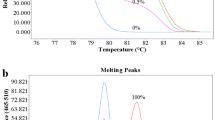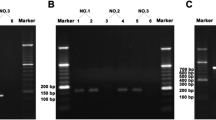Abstract
Background
The insulin-like growth factor (IGF) signaling pathway has an important role in many cancers, including esophageal cancer (EC). IGF-binding protein 7 (IGFBP7) is one of the proteins in this signaling pathway, and its role in cancer has not yet been fully clarified. In the present study, we evaluated the clinical relevance of IGFBP7 methylation status and mRNA expression in EC patients compared to healthy controls. We also investigated whether IGFBP7 methylation status affects mRNA expression.
Methods
The study comprised 100 EC patients and 105 healthy controls. Methylation specific PCR (MSP) was used to examine IGFBP7's promoter methylation and real-time quantitative reverse transcription PCR (qRT-PCR) was used to assess IGFBP7 mRNA expression.
Results
The IGFBP7 promoter methylation was significantly higher in controls than in EC patients (p < 0.05). IGFBP7 mRNA expression was significantly lower in EC patients compared to controls, especially in those over 55 years old (p < 0.0001). The globulin level and reflux were significantly higher in IGFBP7-unmethylated patients compared to IGFBP7 methylated patients (p = 0.01). In EC patients, however, there was no significant relationship between IGFBP7 mRNA expression and methylation in the peripheral blood (p = 0.33). In addition, neither IGFBP7 mRNA expression nor methylation were shown to be linked with survival (p > 0.05).
Conclusion
Our study indicated that promoter unmethylation and mRNA expression of the IGFBP7 promoter in peripheral blood could be different biomarkers for EC. Furthermore, unmethylation of the IGFBP7 promoter in EC patients was associated with reflux and elevated globulin levels. More studies with a larger number of cases is needed to confirm this association.


Similar content being viewed by others
Abbreviations
- IGF:
-
Insulin-like growth factor
- IGFBP7:
-
IGF-binding protein 7
- IGFBP-rp:
-
IGFBP-related protein
- EC:
-
Esophageal cancer
- qRT-PCR:
-
Real-time quantitative reverse transcription polymerase chain reaction
- MSP:
-
Methylation specific PCR
- ESCC:
-
Esophageal squamous cell carcinoma
- EAC:
-
Esophageal adenocarcinoma
- WHO:
-
World Health Organization
- AFP:
-
Alfa feta protein
- M:
-
Methylation
- U:
-
Unmethylation
References
Ye P, Qu CF, Hu XL (2016) Impact of IGF-1, IGF-1R, and IGFBP-3 promoter methylation on the risk and prognosis of esophageal carcinoma. Tumour Biol 37(5):6893–6904. https://doi.org/10.1007/s13277-015-4489-5
Watanabe M, Otake R, Kozuki R, Toihata T, Takahashi K, Okamura A, Imamura Y (2020) Recent progress in multidisciplinary treatment for patients with esophageal cancer. Surg Today 50(1):12–20. https://doi.org/10.1007/s00595-019-01878-7
Eroğlu A, Aydın Y, Altuntaş B, Gündoğdu B, Yılmaz Ö (2016) The increasing incidence of esophageal squamous cell carcinoma in women in Turkey. Turk J Med Sci 46(5):1443–1448. https://doi.org/10.3906/sag-1504-154
Türkay DÖ, Vural Ç, Sayan M, Gürbüz Y (2016) Detection of human papillomavirus in esophageal and gastroesophageal junction tumors: a retrospective study by real-time polymerase chain reaction in an instutional experience from Turkey and review of literatüre. Pathol Res Pract 212(2):77–82. https://doi.org/10.1016/j.prp.2015.10.007
Kaya Z, Almali N, Karan BM, Gorgisen G (2021) Evaluation of TP53 codon 72 polymorphism in esophageal cancer susceptibility in Eastern Anatolia Region of Turkey. East J Med 26(3):388–395
Huang FL, Yu SJ (2018) Esophageal cancer: Risk factors, genetic association, and treatment. Asian J Surg 41(3):210–215. https://doi.org/10.1016/j.asjsur.2016.10.005
Yang YM, Hong P, Xu WW, He QY, Li B (2020) Advances in targeted therapy for esophageal cancer. Signal Transduct Target Ther 5(1):229. https://doi.org/10.1038/s41392-020-00323-3
Jin L, Shen F, Weinfeld M, Sergi C (2020) Insulin growth factor binding protein 7 (IGFBP7)-related cancer and IGFBP3 and IGFBP7 crosstalk. Front Oncol 10:727. https://doi.org/10.3389/fonc.2020.00727
Kashyap MK (2015) Role of insulin-like growth factor-binding proteins in the pathophysiology and tumorigenesis of gastroesophageal cancers. Tumour Biol 36(11):8247–8257. https://doi.org/10.1007/s13277-015-3972-3
Creemers A, Ebbing EA, Pelgrim TC, Lagarde SM, van Etten-Jamaludin FS, van Berge Henegouwen MI, Hulshof MCCM, Krishnadath KK, Meijer SL, Bijlsma MF, van Oijen MGH, van Laarhoven HWM (2018) A systematic review and meta-analysis of prognostic biomarkers in resectable esophageal adenocarcinomas. Sci Rep 8(1):13281. https://doi.org/10.1038/s41598-018-31548-6
Smith E, Ruszkiewicz AR, Jamieson GG, Drew PA (2014) IGFBP7 is associated with poor prognosis in oesophageal adenocarcinoma and is regulated by promoter DNA methylation. Br J Cancer 110(3):775–782. https://doi.org/10.1038/bjc.2013.783
Huang X, Hong C, Peng Y, Yang S, Huang L, Liu C, Chen L, Chu L, Xu L, Xu Y (2019) The diagnostic value of serum IGFBP7 in patients with esophageal squamous cell carcinoma. J Cancer 10(12):2687–2693. https://doi.org/10.7150/jca.32393
Bosman FT, Carneiro F, Hruban RH, Thefgise N (2010) WHO classification of tumours of the digestive system, vol 3, 4th edn. World Health Organization. WHO Classification of Tumours, Lyon
Dimberg J, Hong TT, Skarstedt M, Löfgren S, Zar N, Matussek A (2012) Analysis of APC and IGFBP7 promoter gene methylation in Swedish and Vietnamese colorectal cancer patients. Oncol Lett 5:25–30
Pen A, Moreno MJ, Durocher Y, Deb-Rinker P, Stanimirovic DB (2008) Glioblastoma-secreted factors induce IGFBP7 and angiogenesis by modulating Smad-2-dependent TGF-beta signaling. Oncogene 27(54):6834–6844. https://doi.org/10.1038/onc.2008.287
Pennathur A, Godfrey TE, Luketich JD (2019) The molecular biologic basis of esophageal and gastric cancers. Surg Clin N Am 9(3):403–418
Abnet CC, Arnold M, Wei WQ (2018) Epidemiology of esophageal squamous cell carcinoma. Gastroenterology 154(2):360–373
Zheng L, Tang W, Shi Y, Chen S et al (2014) p21 rs3176352 G>C and p73 rs1801173 C>T polymorphisms are associated with an increased risk of esophageal cancer in a Chinese population. PLoS ONE 9(5):e96958. https://doi.org/10.1371/journal.pone.0096958
Li F, Fan YC, Gao S, Sun FK, Yang Y, Wang K (2014) Methylation of serum insulin-like growth factor-binding protein 7 promoter in hepatitis B virus-associated hepatocellular carcinoma. Genes Chromos Cancer 53(1):90–97. https://doi.org/10.1002/gcc.22120
Zhao Q, Zhao R, Song C, Wang H, Rong J, Wang F, Yan L, Song Y, Xie Y (2021) Increased IGFBP7 expression correlates with poor prognosis and immune infiltration in gastric cancer. J Cancer 12(5):1343–1355. https://doi.org/10.7150/jca.50370
Kaya Z, Akkiprik M, Karabulut S, Peker I, Gullu Amuran G, Ozmen T, Gulluoglu BM, Kaya H, Ozer A (2017) Comparison of telomere length and insulin-like growth factor-binding protein 7 promoter methylation between breast cancer tissues and adjacent normal tissues in Turkish women. J Clin Lab Anal 31(5):e22083. https://doi.org/10.1002/jcla.22083
Kashyap MK, Pawar HA, Keerthikumar S, Sharma J, Goel R, Mahmood R, Kumar MV, Kumar KV, Pandey A, Kumar RV, Prasad TS, Harsha HC (2012–2013) Evaluation of protein expression pattern of stanniocalcin 2, insulin-like growth factor-binding protein 7, inhibin beta A and four and a half LIM domains 1 in esophageal squamous cell carcinoma. Cancer Biomark 12(1):1–9. https://doi.org/10.3233/CBM-120289.
Adachi Y, Itoh F, Yamamoto H, Arimura Y, Kikkawa-Okabe Y, Miyazaki K, Carbone DP, Imai K (2001) Expression of angiomodulin (tumor-derived adhesion factor/mac25) in invading tumor cells correlates with poor prognosis in human colorectal cancer. Int J Cancer 95(4):216–222
Heesch S, Schlee C, Neumann M, Stroux A, Kuhnl A, Schwartz S, Haferlach T, Goekbuget N, Hoelzer D, Thiel E, Hofmann WK, Baldus CD (2010) BAALC-associated gene expression profiles define IGFBP7 as a novel molecular marker in acute leukemia. Leukemia 24(8):1429–1436
Sepiashvili L, Hui A, Ignatchenko V, Shi W, Su S, Xu W, Huang SH, O’Sullivan B, Waldron J, Irish JC, Perez-Ordonez B, Liu FF, Kislinger T (2012) Potentially novel candidate biomarkers for head and neck squamous cell carcinoma identified using an integrated cell line-based discovery strategy. Mol Cell Proteomics 11(11):1404–1415
An W, Ben QW, Chen HT, Zheng JM, Huang L, Li GX, Li ZS (2012) Low expression of IGFBP7 is associated with poor outcome of pancreatic ductal adenocarcinoma. Ann Surg Oncol 19(12):3971–3978
Landberg G, Ostlund H, Nielsen NH, Roos G, Emdin S, Burger AM, Seth A (2001) Downregulation of the potential suppressor gene IGFBP-rP1 in human breast cancer is associated with inactivation of the retinoblastoma protein, cyclin E overexpression and increased proliferation in estrogen receptor negative tumors. Oncogene 20(27):3497–3505
Tomimaru Y, Eguchi H, Wada H, Kobayashi S, Marubashi S, Tanemura M, Umeshita K, Kim T, Wakasa K, Doki Y, Mori M, Nagano H (2012) IGFBP7 downregulation is associated with tumor progression and clinical outcome in hepatocellular carcinoma. Int J Cancer 130(2):319–327
Ruan W, Xu E, Xu F, Ma Y, Deng H, Huang Q, Lv B, Hu H, Lin J, Cui J, Di M, Dong J, Lai M (2007) IGFBP7 plays a potential tumor suppressor role in colorectal carcinogenesis. Cancer Biol Ther 6(3):354–359
Wen J, Ye F, Li S, Huang X, Yang L, Xiao X, Xie X (2015) The Practicability of a Novel Prognostic Index (PI) model and comparison with Nottingham Prognostic Index (NPI) in stage I-III breast cancer patients undergoing surgical treatment. PLoS ONE 10(11):e0143537
Li Q, Meng X, Liang L, Xu Y, Cai G, Cai S (2015) High preoperative serum globulin in rectal cancer treated with neoadjunctive chemoradiation therapy is a risk factor for poor outcome. Am J Cancer Res 5(9):2856–2864
Funding
This work was supported by grants from the Research Foundation of Van Yüzüncü Yıl University (BAP) (TSA-2018-6583).
Author information
Authors and Affiliations
Corresponding author
Ethics declarations
Conflict of interest
The authors declare that there are no conflicts of interest.
Ethical approval
The study has been approved by the ethics committee of SBU Van Education and Research Hospital (Approval Number: 2017/7, Approval Date: September 28, 2017) with the 1964 Helsinki declaration and its later amendments or comparable ethical standards.
Informed consent
Informed consent was obtained from all study participants.
Additional information
Publisher's Note
Springer Nature remains neutral with regard to jurisdictional claims in published maps and institutional affiliations.
Rights and permissions
About this article
Cite this article
Kaya, Z., Almalı, N., Sahin, E.S. et al. Association of insulin-like growth factor binding protein-7 promoter methylation with esophageal cancer in peripheral blood. Mol Biol Rep 49, 3423–3431 (2022). https://doi.org/10.1007/s11033-022-07173-y
Received:
Accepted:
Published:
Issue Date:
DOI: https://doi.org/10.1007/s11033-022-07173-y




